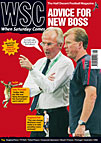 Football still isn't the number-one sport in Australia but, believes Mike Ticher, Guus Hiddink's team showed plenty of others how the game should be played
Football still isn't the number-one sport in Australia but, believes Mike Ticher, Guus Hiddink's team showed plenty of others how the game should be played
When the world seems to have changed utterly, it takes only one moment to shatter the illusion. Mine came after Craig Moore’s equalising penalty against Croatia in Stuttgart, when the animated bloke in the Socceroos shirt next to me said: “So, what happens if it’s a draw?”
It was a timely reminder that two frenzied weeks of euphoria and anguish had not turned Australia into a football-speaking land. It was bizarre returning to hear Australian rules commentators refer to the World Cup drama without a trace of envy, to be accosted for an opinion by people with no previous known interest in the game and to discover the coach of my son’s team experimenting rashly with 3‑5‑2. But while the emotions engaged by the national team showed that enthusiasm for football here is broad, innumerable loose references to “kicking goals” and “reaching the grand final” confirmed that it is still not deep.
The good thing about the public response was that the performances deserved it. Getting to the second round was an achievement in itself, but equally important was that Guus Hiddink’s group played some bold, refreshing and courageous football, which reflected Australia’s sporting preference never to “die wondering” through timidity. In what turned out to be the most boring World Cup since 1990, the Socceroos at least contributed two eye-catching comebacks and gave as good as they got against Brazil and Italy.
Hiddink above all deserves credit, not merely for his uncanny ability to get more out of players than they knew they had (though his faith in Zeljko Kalac remains a mystery), but also for a calculated willingness to take risks that was sadly missed once the tournament was abandoned to the suffocating caution of Scolari, Lippi and their ilk.
“We wanted to play attractive, spectacular football, and we did,” said Hiddink. His ambition was most evident against Brazil, when a chanceless 1-0 defeat would have been considered a triumph by most. Hiddink judged instead that he had nothing to lose by going forward and might have been rewarded with a draw if only Harry Kewell knew where the goal was. The incredibly energetic and adaptable performances he coaxed from wing-backs Brett Emerton and Scott Chipperfield allowed him to make such ambitious substitutions that the team ended up playing with “only one defender” as Lucas Neill put it.
At the time the feeble penalty award that put out Australia seemed grotesquely undeserved, but with hindsight it was perfect, leaving the team and the country feeling that they might have gone further, yet without having to prove it (they would have “smashed” Ukraine, Neill assured us).
The downside was an unedifying wave of media self-righteousness that portrayed the team as plucky but naive outsiders and the Italians as manipulating and incorrigible cheats. Curious, given that almost the entire squad has played at or near the top level in Europe, including several in Italy (and two of Italian background). It was particularly rich coming from Neill, whose idea of a good, honest challenge has left its mark on Jamie Carragher, among others.
That bout of mild hysteria was a shame, since the immediate response of the players, coach and fans to a bitter defeat put them in a wholly positive light, especially compared with, say, Argentina. The travelling fans really did fulfil some stereotypes, bringing a slightly wide-eyed air of first-timers happy just to be there. Their lack of original songs betrayed the absence of a strong domestic club culture (perhaps fortunately, given one war-related effort I heard at the Japan game) but I had hoped for a bit more than the all-too-familiar armies of replica shirts. Yes, there were blow-up kangaroos, a smattering of Barry McKenzie-style ribaldry (T-shirts reading “I’ll show you my Australian if you show me your Brazilian”) and a solitary pithy banner in Stuttgart parodying the tourist board’s recent campaign (“Where the bloody hell am I?”), but I had expected every tiny football club in the country to thrust its name on to global TV.
Instead, some fans seemed to be there as much to revel in a backpacker version of Aussiedom as to support football specifically. Or, as one passing drunk lamented in the chaotic aftermath of the Japan game, with AC/DC and other comfort sounds of Ozrock battering Kaiserslautern town centre: “It’s just like being on Cronulla beach.”
For the many thousands of long-denied football fans there in person, or braving the chilly dawns at home, it was much better than that.
From WSC 234 August 2006. What was happening this month